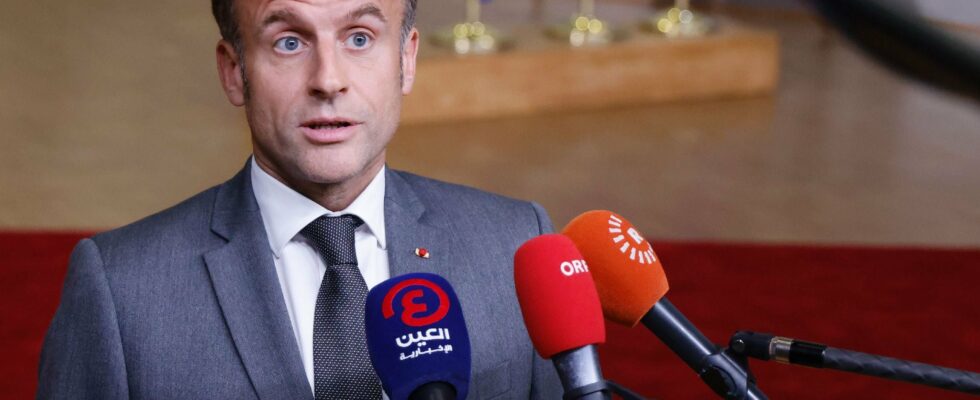“An act of self-sabotage” worthy of a “hysterical and unpredictable” head of state: this is how the independent German daily Der Spiegel (translated by International mail) describes the decision taken by Emmanuel Macron to dissolve the National Assembly and to call early legislative elections, after the victory of the National Rally (RN) in the European elections on June 9. Whether progressive or conservative, the foreign press does not do the French head of state any favors, and is concerned about the consequences of his actions on the stability of the regime in France and, more broadly, in the European Union. .
“It is a certainty, Emmanuel Macron has lost his sense of reality,” castigates the English-language news site. The Localwho believes that the current majority can no longer hope to rely solely on the argument of the electoral barrier against the extreme right to hope to be re-elected. “The French do not want Macron to save them,” tackles Der Spiegel“Whatever happens, it will be one of the craziest bets in modern French history,” sums up the New York Times.
Many interpret Emmanuel Macron’s poker move as an attempt to bring the RN to power in order to better discredit it, and thus “demystify the party’s protest appeal”, analyses the New York Times, who sees it as a “cynical” tactic. “It is entirely possible that this peremptory demand that voters ‘take responsibility’ could backfire spectacularly,” comments The GuardianAnd worse still: that it not only destabilizes the internal political balance of France, but also the European bloc, by offering a boulevard to the extreme right in a central country of the European Union, notes the daily.
Macron condemned to become “a lame duck”
Across the Channel, political observers are indeed worried about a possible paralysis of the regime: “A resounding victory for the far right could make Macron a lame duck, condemned to ‘cohabit’ with an openly xenophobic, Islamophobic, authoritarian and illiberal government,” continues the British newspaper. And even if the RN does not obtain an absolute majority of at least 289 seats, it should still establish itself as the most significant political bloc following the election, forcing Emmanuel Macron and his party to seek alliances of circumstance, which are more fragile.
The Local expects to see France once again slip into a “new Fourth Republic (1947-1958)” and to return “to the waltz of governments”. “Expect more drama to come,” also reports the New York Timesmentioning the multiple ruptures and recompositions at work within French political movements, from the quarrels of the Republicans to the disputes on the left.
“Destructive” elections internationally
But the concerns do not only concern France. For the European editorial staff of Politicothese legislative elections could “be the most destructive since the war – not only for France, but also for the European Union, the Atlantic Alliance and what remains of the post-war liberal world order”, in the event of a victory of a populist party. Weakened, Emmanuel Macron “will no longer be the driving force of the European Union, he will have difficulty in fulfilling his role as a firm supporter of Ukraine against Russia, envisages The Mirror. It is already causing nervousness in the financial markets, which fear a new euro crisis.”
The Economist is also concerned about the possible consequences of the election on the French economy: “Politics risks hindering the rebirth of Paris as a global commercial center”, since, according to the liberal daily, “extreme parties right and far left in the lead” both present “untenable spending plans that scare off investors”.
A possible victory for the left?
But the victory of the National Rally is not the only scenario being studied in Europe and across the Atlantic. “Forget the far right. It’s the left that could put pressure on Macron,” was the headline in mid-June Politicoafter the announcement of the formation of the New Popular Front. For the media specializing in European issues, Emmanuel Macron’s bet to win the legislative elections was based on the speculation that the left would run in a dispersed manner and end up losing the elections, having to transfer its votes to the current majority to block it.
However, “the last legislative elections demonstrated the strength of the French left when it unites,” recalls the New York Times, which does not exclude that the New Popular Front could create a surprise on June 30 and July 7. An option less considered by The Localwhich speaks of an alliance of circumstance “like a tentacular hydra, whose numerous heads try to devour each other” and which “brews wide, of the protesting left […] to former President François Hollande.”
In the end, the failure of the centrist project
If there are numerous and divergent speculations on the turn that the French political situation could take in the weeks to come, all point to the failure of Emmanuel Macron’s centrist project. “He was unable to offer a great unifying story around centrist reformism. Everything he undertook on the subject of immigration or delinquency seemed insufficient to the right and scandalous to the left,” writes the British journalist John Lichfield.
Furthermore, the “neither extreme left nor extreme right” discourse adopted by the president in recent days has been strongly criticized in Switzerland, where Tages-Anzeiger sees not only “a factual error” in the political assessment of the New Popular Front, but also a reflection of the trivialization of the rhetoric of the extreme right. “He claims to want to strengthen the moderate parties of the center and is extreme in his speeches and in his actions. This cannot end well,” protests again The Mirror. Finally, the New York Times The question arises as to what mark this bluff will leave on French political history: “He may be remembered not as a principled opponent of the far right, but as a reckless facilitator.”
